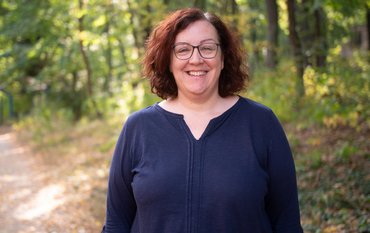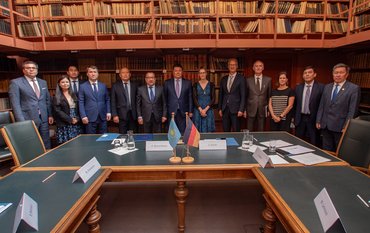In this interview, Dr. Abror Gafurov describes his impressions of the last COP and looks at this year's conference in Baku, which has begun last week and ends today. He is currently still attending the 29th Conference of the Parties (COP29), which takes place in the Azerbaijani capital, on behalf of the GFZ. Gafurov is a hydrologist and his research topics on water availability, snow cover and glacier melt are deeply rooted in the Central Asian region.
What is your role at the UN Conference of the Parties, the 29th Conference of Parties (COP)?
At the GFZ we implement several projects dedicated to water resources and climate change in Central Asia. The "CAWa Green" and CLIMWATER projects are currently running projects in Central Asia. I am taking part as coordinator of these project at COP29.
What is a day at the COP like?
A COP is a huge event. More than 80,000 people took part last time, this time the number of participants is limited to 40,000. There are lots of sessions, workshops and presentations on practically every topic. You have to find your way around first. It is always very important to plan your day at a COP well, otherwise you can miss a lot.
Should we understand the COP as a scientific conference?
The COP is a bit different from scientific conferences. I got the impression that a platform like the COP is exactly what is needed, a stage where we scientists can share our knowledge with important users and decision-makers. There are usually a lot of stakeholders, users and politicians on site. We researchers are used to designing our speeches in a very scientific way when we are at conferences. It's different at the COP. It's about explaining science in an understandable way, especially to politicians, and getting it across well. Most of my sessions at the last COP were about climate change and its impact on water resources, the cryosphere, snow, glaciers and permafrost - especially in Central Asia.
What were your personal impressions of the last COP?
For me, the last COP was also my first participation. It was a very good opportunity to get information and orientation in this special climate change science community: Where does the GFZ stand and where do I stand? These were the two questions to which I was able to find answers at this COP. We do research every day, then go to our scientific conferences and then back to our research. For us, this is largely a closed space. The COP gives us the opportunity to look further outwards: What are others doing? What do politicians need, what do other users need? It was therefore a great personal benefit for me to find out where I stand: am I on the right track? Should I broaden my horizons or think more concretely?
And can you say where the GFZ stands?
I can speak for my focus region of Central Asia and say that the GFZ is very visible in Central Asia, partly because we have been carrying out projects there for many years and have been closely linked to the Central Asian Institute for Applied Georesearch CAIAG in the Kyrgyz capital Bishkek for 20 years.
In your opinion, what major progress was made at the last COP?
The major, overarching progress made at the last COP was the decision to phase out fossil fuels and that the capacity of renewable energies is to be tripled by 2030.
Was there any tangible progress or findings specifically in relation to your field of hydrology? What specifically are you hoping for this time?
For me and my research group at GFZ, the main thing I took away from the last COP was the direction in which topics relating to water, water research and hydrology will develop in the future. One thing is very clear: Natural hazards will be a particular focus in the future. In Germany, for example, we experienced the dangers posed by water with the flood in the Ahr Valley in 2021 and with two large-scale flooding events at the turn of the year 2023/24 and in June 24, and recently in September in Poland and Austria and in October in the Valencia region, among other places: these are events that also came about due to climate change and other human influences. Accordingly, one of the top themes of COP last year and this year was the "Early Warning System for All" initiative declared by the UN Secretary General Antonio Guterres. This is the subject of our discussions again this year, as we will have to expect such devastating events more frequently in the future.
What does "Early Warning System for All" mean in concrete terms?
Our goal must be to ensure that everyone in the world can be warned of the various natural hazards as early as possible. And water is a key risk factor in many parts of the world in this regard. So far, our central topic has been the availability of water, which is becoming more critical in many parts of the world as climate change progresses. At the COP, I realized that in the future we should also pay more attention to extreme events such as floods, landslides, snow avalanches and flash floods, where there is too much water. They also threaten people and infrastructure and will also increase. So, the goal of the “Early Warning System for All” initiative is to ensure that everyone on Earth is protected from hazardous weather, water or climate events through life-saving early warning systems by the end of 2027.
How do you see your role as a researcher when it comes to early warning?
I can give the example of the Ahr valley flood. There, we scientists were able to install many measuring devices in good time and thus trace the events in order to understand how such devastating flooding and damage could occur. In the future, we will have to devote even more attention to anticipating scenarios associated with such extreme events. We can never predict exactly how much it will rain and where. This can also exceed all our expectations, as in the Ahr Valley: such a heavy rain event has never been observed there before - and accordingly, no one there had expected such devastating proportions. However, extreme events will increase and we must learn to expect the worst much more in future, develop appropriate scenarios and communicate these to decision-makers and the local population. In Central Asia, we also put our efforts together with partners in the region to forecast natural hazards such as floods, droughts and avalanches using modern datasets and modeling approaches.
So we should focus more on unprecedented events?
Yes, exactly. When it comes to floods, we should not "only" expect the worst-case scenario to occur in a century, as we have done so far, or floods that are only expected to be this severe every hundred years on average, but also unprecedented scenarios.
This year, COP29 is taking place in Baku (Azerbaijan). Water resources is an important topic for Central Asia. What issues are important for this region?
Many people live in the mountainous region of Central Asia and may have believed for generations that their environment is stable - if they have not experienced water shortages or natural disasters. But in the mountains, for example, there is always the risk of landslides or avalanches - and it will increase: With climate change, we expect more precipitation, we especially expect more liquid precipitation, meaning rain rather than snow. Such forms of precipitation lead to flood events and water shortages in summer months in Central Asia but also lead to slopes becoming unstable and turning into natural hazards. For me personally, such issues have not been the most important research topics so far, but at the last COP, and now again, I can see that there will be more demand for such topics in the future. We need to investigate what impact temperature changes of 1.5 degrees can have on a particular area.
In your opinion, were there or are there issues that are not being given enough thought by politicians? Can you think of anything ad hoc here?
In my opinion, there was and is an issue that is not being thought through sufficiently. The postulate is: "Into renewable energies - out of fossil fuels". However, the extent to which green energy, for example from hydropower plants, can actually replace fossil fuels does not seem to be addressed sufficiently. There was too much focus on reducing fossil fuels, but not enough on the alternatives, especially in the hydropower sector. There needs to be more discussion about whether the amount of renewable energy that can be produced is sufficient to fully compensate for fossil energy and what other options there are.
Does the compensation of fossil fuels also play a role as a research topic in Central Asia?
In Central Asia, hydropower plants for the production of renewable energy are a major topic. As scientists, we have to accurately calculate and model the water runoff for hydropower plants. We need to be able to predict how much water is available in a particular catchment area so that energy production can be optimized. And that's why it's definitely our subject area.
The results of the last COP included the creation of a "Global Adaptation Fund" and the "Fresh Water Challenge" initiative, which focuses on degraded rivers, the restoration of wetlands and the restoration of degraded freshwater ecosystems. To what extent is this relevant to your research?
The "Fresh Water Challenge" in particular also affects our field of research. In hydrology, we have the term "low flow". This expresses the fact that as rivers dry out, flora and fauna also decline. So the amount of water a river carries is naturally also a question of ecosystem. A low flow limit should therefore be defined for each river, which we as scientists can calculate. Up to this limit, flora and fauna would be preserved and the ecosystem protected as far as possible.
We have just heard from the European climate monitoring system Copernicus that the 1.5 degree target will be exceeded for the first time this year. It is therefore very likely that we will no longer be able to achieve the Paris climate protection targets. The USA has also announced its withdrawal from the climate protection agreement. What still gives you hope?
It's actually the COP, this Conference of the Parties, that gives me hope. We always say that we won't reach the target, but there is always progress. Four years ago there was the COP in Glasgow. There it was put on paper that we want to phase out fossil fuels. That was a very big discussion at the time. At the last COP in Dubai, it was no longer a topic of discussion at all; that's the kind of progress I see.
At the moment, it is said that achieving the 1.5 degree target is very unlikely, because that is how we see it with the current state of knowledge. But if we continue to work with motivation in the right direction and keep having this discussion at future COPs, we will probably still find opportunities. After all, there are still innovations, innovative solutions and perhaps in five or ten years there will be even better solutions that we couldn't even include in our forecasts today.
Mr. Gafurov, thank you very much for the interview!


![[Translate to English:] [Translate to English:] Abror Gafurov von dem Schriftzug "Welcome to Azerbaijan" und den UN und COP Logos](/fileadmin/_processed_/2/5/csm_2024_11_Baku_COP29_Abror_Gafurov_fc0fc06ae6.jpeg)

![[Translate to English:] [Translate to English:] Veranstaltung/ Vortrag von Abror Gafurov auf der COP](/fileadmin/_processed_/0/0/csm_2024_11_17_Baku_COP29_Abror_Gafurov_43624ca248.jpeg)
![[Translate to English:] [Translate to English:] Standing in a half-circle, Dr. Abror Gafurov in a meeting with the General Director of Agency for Hydrometeorological Service of the Republic of Tajikistan, Mr. Abdullo Qurbonzoda (left) and two more people at the COP29 in Baku.](/fileadmin/_processed_/d/c/csm_2024_11_Baku_COP29_tajikistan_meeting__Abror_Gafurov_cb52651c3b.jpeg)











![[Translate to English:] Martin Herold standing in front of the library on the Telegrafenberg](/fileadmin/_processed_/c/d/csm_Martin_Herold_d385ee4dd9.jpeg)
![[Translate to English:] Many people are listening to a presentation in the GFZ lecture hall.](/fileadmin/_processed_/c/a/csm_1_Bild1_hell_b9c0e9f5ed.jpeg)






![[Translate to English:] Both scientists sitting on stools in front of a wall of books in the Telegrafenberg library](/fileadmin/_processed_/6/6/csm_Buiter_Castell_DORA_4_e87cb1ea18.jpeg)
![[Translate to English:] Gruppenbild mit 4 Personen](/fileadmin/_processed_/8/d/csm_20241017_GFZ-Emmerman-Medal-005_web_reinhardtundsommer_21a414fa4a.jpeg)






![[Translate to English:] Ice landscape with five red tents](/fileadmin/_processed_/8/9/csm_Zeltlager_auf_dem_Eis_Urheberin_Jenine_McCutcheon_5ced2d523b.jpeg)



